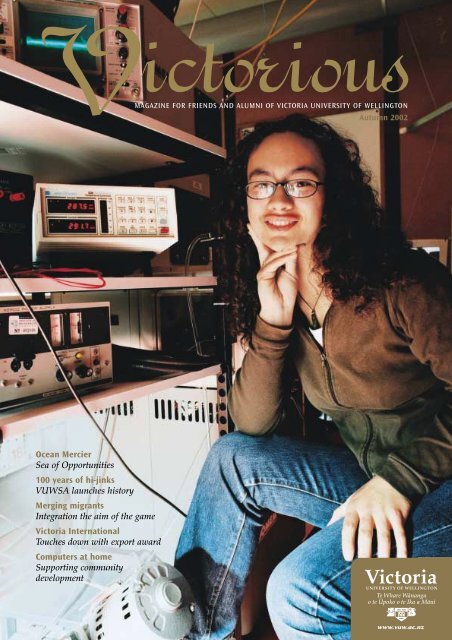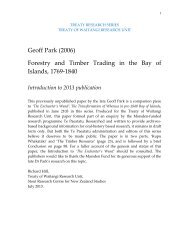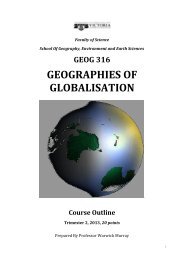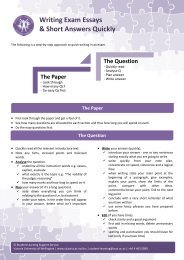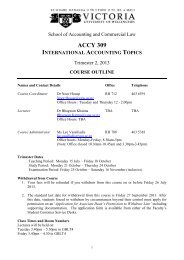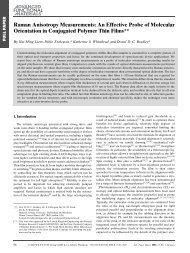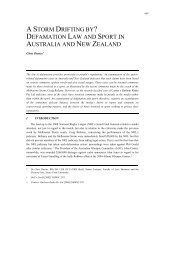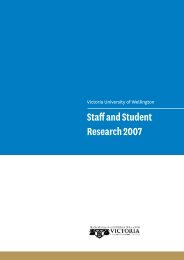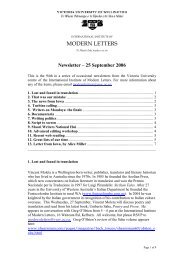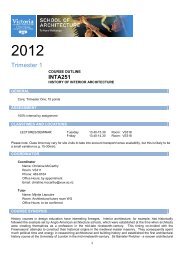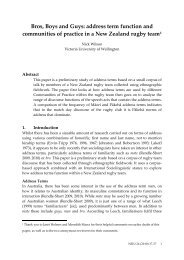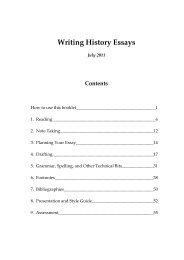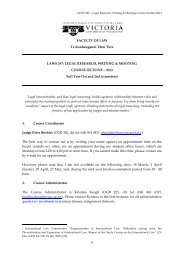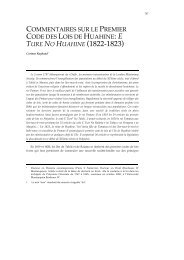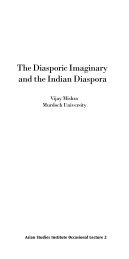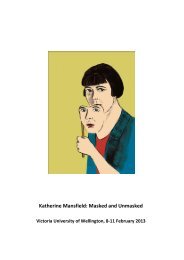Ocean Mercier Sea of Opportunities 100 years of - Victoria ...
Ocean Mercier Sea of Opportunities 100 years of - Victoria ...
Ocean Mercier Sea of Opportunities 100 years of - Victoria ...
You also want an ePaper? Increase the reach of your titles
YUMPU automatically turns print PDFs into web optimized ePapers that Google loves.
<strong>Ocean</strong> <strong>Mercier</strong><br />
<strong>Sea</strong> <strong>of</strong> <strong>Opportunities</strong><br />
<strong>100</strong> <strong>years</strong> <strong>of</strong> hi-jinks<br />
VUWSA launches history<br />
Merging migrants<br />
Integration the aim <strong>of</strong> the game<br />
<strong>Victoria</strong> International<br />
Touches down with export award<br />
Computers at home<br />
Supporting community<br />
development<br />
MAGAZINE FOR FRIENDS AND ALUMNI OF VICTORIA UNIVERSITY OF WELLINGTON<br />
Autumn 2002
Immunity research trail<br />
These snails, Biomphlaria glabrata, play a lead role in<br />
Anne La Flamme’s study <strong>of</strong> a tropical human pathogen<br />
that may hold the key to understanding immunity to<br />
inflammatory diseases.<br />
A medical curiosity involving some <strong>of</strong> the<br />
world’s poorest people could potentially<br />
benefit many in developed countries who<br />
suffer from diseases such as multiple<br />
sclerosis (MS).<br />
Biological Sciences lecturer, Dr Anne La<br />
Flamme, has won US funding for her<br />
research project into the apparent absence <strong>of</strong><br />
chronic inflammatory diseases such as MS in<br />
the tropics.<br />
Anne, who arrived in New Zealand last<br />
year from New York’s Cornell University, is<br />
a specialist in tropical parasitic infections.<br />
One such disease, schistomsomiasis, a worm<br />
which infests the blood, afflicts 200 million<br />
people. But Anne says people living in the<br />
tropics appear to have a significantly<br />
reduced risk <strong>of</strong> developing chronic<br />
inflammatory diseases, such as asthma,<br />
diabetes and multiple sclerosis.<br />
She has embarked on a research project<br />
with Dr Thomas Bachstrom <strong>of</strong> the Malaghan<br />
Institute <strong>of</strong> Medical Research in Wellington.<br />
His interest is in how people can acquire<br />
immunity to illness whereas Anne specialises<br />
in the innate immunity that some enjoy.<br />
Anne says the preliminary study is<br />
assessing whether there is any sort <strong>of</strong><br />
protection that people in tropical regions<br />
have from chronic inflammatory diseases.<br />
Funding for the research has come from the<br />
National Multiple Sclerosis Society in the<br />
United States.<br />
If the research suggests that a chronic<br />
parasitic infection such as schistosomiasis<br />
can protect against the development <strong>of</strong> a<br />
chronic inflammatory disease, then this may<br />
point the way to benefits for MS and other<br />
disease sufferers. “The idea is, can we<br />
somehow mimic that response,” Anne says.<br />
The joint <strong>Victoria</strong>/Malaghan Institute<br />
research project runs until October. By that<br />
time, a decision will have been made on<br />
further research.<br />
Contact: Tel +64-4-463 6093<br />
E-mail Anne.Laflamme@vuw.ac.nz
Contents<br />
1 From the Vice-Chancellor<br />
2 Graduation party time<br />
Mana mentor<br />
Music for the gods<br />
IT big chief<br />
3 CoRE blimey!<br />
4 Honoured alumni<br />
A Doctor in the house<br />
5 A sea <strong>of</strong> opportunities<br />
6 On the ball<br />
Merging migrants ahead<br />
7 PCs @ home<br />
8 Politics and policy<br />
Beijing-Taipei relations<br />
FRST chariot <strong>of</strong>f the rank<br />
9 Digitising book trade history<br />
<strong>100</strong> <strong>years</strong> <strong>of</strong> hi-jinks<br />
10 Gift for the future<br />
Meeting <strong>of</strong> beautiful minds<br />
Muldoon still casts a shadow<br />
11 IIML superstars<br />
Police youth diversion<br />
TV policy goes to air<br />
12 New programmes<br />
One for the road<br />
13 Changes in the moral market<br />
A conflicting issue<br />
Mature Mäori embracing education<br />
14 From cow to customer<br />
Sir Ivor comes home<br />
Morena Vietnam<br />
15 <strong>Victoria</strong> University Press Books<br />
16 Life after Vic<br />
17 Adam Art Gallery update<br />
Victorious is published three times a year by <strong>Victoria</strong> University <strong>of</strong> Wellington, Te Whare<br />
Wänanga o te Üpoko o te Ika a Mäui, PO Box 600, Wellington, New Zealand.<br />
www.vuw.ac.nz To notify a change <strong>of</strong> address: Tel +64-4-463 5128, Fax +64-4-463 5108.<br />
E-mail alumni-relations@vuw.ac.nz Editorial team: Juliet Montague, Jude Urlich, Melanie<br />
MacDiarmid, Brendon Burns. Photographs (unless otherwise credited): Image Services,<br />
<strong>Victoria</strong> University <strong>of</strong> Wellington.<br />
Cover photo: <strong>Ocean</strong> <strong>Mercier</strong>, physics PhD graduate, at Industrial Research Ltd, Wellington.<br />
ISSN 1172-0387 © <strong>Victoria</strong> University, 2002<br />
From the<br />
Vice-Chancellor<br />
<strong>Victoria</strong> University is going from strength<br />
to strength. We have been highly<br />
successful at competing for recognition in<br />
the Centres <strong>of</strong> Research Excellence<br />
process, many <strong>of</strong> our staff have received<br />
awards and pr<strong>of</strong>essional accolades, we<br />
have exceeded most <strong>of</strong> our Strategic Plan<br />
targets for 2001, and our domestic and<br />
international student numbers have<br />
increased. Most universities have static or<br />
declining domestic enrolments. Our<br />
Strategic Plan, which is designed to take<br />
us forward for the next ten <strong>years</strong>, has set<br />
an objective <strong>of</strong> two percent growth per<br />
annum in domestic students. This year<br />
we expect to achieve that, and more.<br />
We also have an objective for 20<br />
percent <strong>of</strong> revenue to come from<br />
international activities and we are on<br />
track to achieving that too. At the same<br />
time, <strong>Victoria</strong> University has been<br />
honoured, through a TradeNZ Export<br />
Award, for the quality care provided to<br />
international students. It is unfortunate<br />
that recent publicity about poor<br />
international student services in parts <strong>of</strong><br />
the secondary school sector and in some<br />
private training institutions has tarnished<br />
the reputations <strong>of</strong> universities who strive<br />
to provide excellent services.<br />
In May 1,500 students graduated. We<br />
were also able to award honorary<br />
doctorates to three significant New<br />
Zealanders. The smiles on the faces <strong>of</strong><br />
staff, students, families and friends as we<br />
marched through the streets <strong>of</strong> Wellington,<br />
confirms that our students are proud to be<br />
associated with <strong>Victoria</strong> University. We<br />
now welcome them as members <strong>of</strong> the<br />
Alumni Association, and look forward to<br />
keeping in touch over the coming <strong>years</strong>.<br />
Stuart N McCutcheon<br />
Victorious Autumn 2002 1
Photography by Woolf<br />
Graduation party time<br />
May’s graduating students swapped<br />
memories <strong>of</strong> late nights in the library and<br />
the lab for a spin on the dance floor and a<br />
night <strong>of</strong> musical magnificence. The<br />
student clobber <strong>of</strong> t-shirts and trainers<br />
was replaced with bow ties and ball<br />
gowns as friends and family joined in to<br />
celebrate the good times.<br />
Mana mentor<br />
Stormy Mohi (right) at Mana College.<br />
Music for the gods<br />
A sabbatical in Greece, original home and next host <strong>of</strong> the<br />
Olympics, inspired a new work by John Psathas which is to be<br />
performed during July’s Commonwealth Games in Manchester.<br />
John, Senior Lecturer in music, wrote View from Olympus: Double<br />
Concerto for Piano, Percussion and Orchestra while on sabbatical in<br />
2000. It will premiere at the Royal Gala finale concert <strong>of</strong> the<br />
Commonwealth Games music festival. The piece will be performed<br />
by internationally acclaimed percussionist Evelyn Glennie, pianist<br />
Philip Smith, and the Hallé Orchestra.<br />
2 Victorious Autumn 2002<br />
This year saw the successful<br />
introduction <strong>of</strong> a musical celebration <strong>of</strong><br />
graduation. Presented jointly by the<br />
Schools <strong>of</strong> Music and Law, the Bell Gully<br />
Graduation Gala at the Michael Fowler<br />
Centre was a musical extravaganza<br />
bursting with celebratory works selected in<br />
the spirit <strong>of</strong> the occasion. Lyell Cresswell,<br />
alumnus and honorary doctorate recipient,<br />
was paid tribute with a performance <strong>of</strong> his<br />
piece for the horn and strings, Pianto-In<br />
Memoria di Roger Cresswell.<br />
A few nights later in the Old Town Hall<br />
the corks were popping and the music<br />
cranked up a notch for the hundreds <strong>of</strong><br />
graduates and their friends at the<br />
Graduation Ball. Organised by VUWSA and<br />
sponsored by WestpacTrust and the Alumni<br />
Association, graduation was not the only<br />
Stormy Mohi always knew that he would<br />
go to University—it was just his teachers<br />
who had their doubts!<br />
Stormy’s grades weren’t good enough to<br />
get straight into a degree programme but<br />
after completing Tohu Mäoritanga—a<br />
bridging course at <strong>Victoria</strong>—and gaining a<br />
diploma in Mäori Studies he was ready to<br />
forge ahead with a Bachelor’s qualification.<br />
Now with a BA in Mäori Studies and<br />
Linguistics and working at Te Taura Whiri i<br />
te Reo Mäori, the Mäori Language<br />
Commission, Stormy wants to help other<br />
college pupils succeed. He’s joined a group<br />
<strong>of</strong> volunteer graduates participating in a<br />
IT big chief<br />
celebration <strong>of</strong> the night. A cake and ten<br />
candles marked the anniversary <strong>of</strong> the<br />
Alumni Association and provided hungry<br />
revellers with the sustenance to keep on<br />
partying!<br />
Conductor Pr<strong>of</strong>essor Peter Walls and music graduates.<br />
tutoring scheme established by Heeni<br />
Shortland, <strong>Victoria</strong> Community Coordinator.<br />
Their aim is to increase<br />
participation and achievement amongst<br />
Mäori and Pacific college pupils and show<br />
them the value <strong>of</strong> a university qualification.<br />
For five hours each week, Stormy joins<br />
Heeni to tutor groups <strong>of</strong> students at Mana<br />
and Porirua Colleges. “It’s just as important<br />
for me to help them with their school work<br />
as it is to tell them that university study is a<br />
good and accessible option,” Stormy says.<br />
Contact: Tel +64-4-463 6673<br />
E-mail Heeni.Shortland@vuw.ac.nz<br />
Pr<strong>of</strong>essor Sid Huff, Head <strong>of</strong> the School <strong>of</strong> Information<br />
Management, has been appointed as Australasia/Far East<br />
representative on the Council <strong>of</strong> the Association <strong>of</strong> Information<br />
Systems (AIS). Sid, who has taught and researched Information<br />
Systems (IS) for more than 20 <strong>years</strong>, was elected by his peers in a<br />
worldwide web-based election. AIS serves as the premier global<br />
organisation for academics specialising in IS and seeks to advance<br />
knowledge <strong>of</strong> information technology to improve organisational<br />
performance and individual quality <strong>of</strong> work life.<br />
The Evenning Post
CoRE blimey!<br />
Achieving critical mass through<br />
collaborative partnerships and passing on<br />
the talent are key themes shared by the<br />
University’s involvement in four successful<br />
Centres <strong>of</strong> Research Excellence (CoRE)<br />
projects.<br />
In a hotly-contested application process<br />
for $60 million <strong>of</strong> new Government funding,<br />
five applications <strong>of</strong> the 45 submitted were<br />
from <strong>Victoria</strong> University. Four <strong>of</strong> the<br />
University’s five made it to the initial<br />
shortlist <strong>of</strong> 16. In the final decision, only five<br />
projects were chosen and <strong>Victoria</strong> is<br />
represented in four <strong>of</strong> them.<br />
The CoRE funding process is described<br />
by Pr<strong>of</strong>essor Paul Callaghan FRS, Director <strong>of</strong><br />
the Alan MacDiarmid Institute for<br />
Advanced Materials and Nanotechnology,<br />
and President <strong>of</strong> the Academy <strong>of</strong> the Royal<br />
Society <strong>of</strong> NZ, as “…a reality check for the<br />
University system that has put corporate<br />
games to bed and discovered excellence in<br />
many surprising places.”<br />
The Alan MacDiarmid Institute for<br />
Advanced Materials and Nanotechnology is<br />
a partnership with the University <strong>of</strong><br />
Canterbury, Industrial Research Limited and<br />
the Institute <strong>of</strong> Geological & Nuclear<br />
Sciences. Staff from Massey, Auckland and<br />
Otago universities are also involved in key<br />
projects. The International Advisory Board<br />
includes eminent alumni Pr<strong>of</strong>essor Alan<br />
MacDiarmid, Nobel Laureate; Pr<strong>of</strong>essor<br />
Michael Kelly FRS, University <strong>of</strong> Surrey;<br />
Pr<strong>of</strong>essor Neil Ashcr<strong>of</strong>t, Cornell University;<br />
and Pr<strong>of</strong>essor Mark Warner, Cambridge<br />
University.<br />
The Institute has four research themes:<br />
Nanoengineered materials and devices<br />
which will involve new optical elements<br />
made from chiral materials; Novel<br />
electronic, electro-optic and superconducting<br />
materials will study, for<br />
example, blue lasers and high-temperature<br />
superconducting wires; Functional materials<br />
will explore our knowledge <strong>of</strong> anticorrosive<br />
paints, paper electronics and<br />
computers, and self-cleaning and selfsterilizing<br />
surfaces; and S<strong>of</strong>t Materials,<br />
Complex Fluids and Porous Media will<br />
involve paints and plastics, new food<br />
textures, biomaterials, and the physics <strong>of</strong> oil<br />
extraction.<br />
Paul says that the Institute’s overarching<br />
goal is a completely inter-linked<br />
Pr<strong>of</strong>essor Alan MacDiarmid & Steve Maharey Associate Minister <strong>of</strong> Education (Tertiary Education) unveil a<br />
commemorative photo at the new MacDiarmid Institute.<br />
programme. Passing on learning to a<br />
younger generation is also key. Funds have<br />
been reserved for secondary school outreach<br />
activities.<br />
The other three CoRE projects <strong>Victoria</strong> is<br />
involved in bring together the country’s top<br />
researchers in their fields. The National<br />
Institute <strong>of</strong> Research Excellence for Mäori<br />
Development and Advancement: Ngä Pae o<br />
te Märamatanga (Horizons <strong>of</strong> Insights)<br />
involves the School <strong>of</strong> Education’s Institute<br />
for Research and Development in Mäori<br />
Education, He Pärekereke. <strong>Victoria</strong><br />
University’s involvement is co-ordinated by<br />
Wally Penetito while the Institute itself is<br />
hosted by the University <strong>of</strong> Auckland. The<br />
Institute’s strategic focus is on sustainable<br />
and healthy communities, social and<br />
educational transformation and new<br />
frontiers <strong>of</strong> knowledge. Wally says that the<br />
context is, “Mäori perspectives and<br />
experiences, discipline-based methodologies<br />
and dual philosophical traditions.”<br />
The Allan Wilson Centre for Molecular<br />
Ecology is a study <strong>of</strong> the evolution <strong>of</strong> life.<br />
Pr<strong>of</strong>essor Charles Daugherty, Head <strong>of</strong> the<br />
School <strong>of</strong> Biological Sciences, is programme<br />
director <strong>of</strong> the Centre focusing on the<br />
research theme <strong>of</strong> biodiversity. Three other<br />
critical areas <strong>of</strong> study are being led by<br />
researchers from Massey, Auckland and<br />
Canterbury universities. Charles says the<br />
Centre’s formation brings new opportunities<br />
for postdoctoral and postgraduate students.<br />
“The new tools <strong>of</strong> DNA analysis will<br />
stimulate and promote further research into<br />
the rates and modes <strong>of</strong> evolution and will<br />
assist the Centre to contribute to knowledge<br />
about the settlement <strong>of</strong> Aotearoa.”<br />
High-level mathematical techniques are<br />
essential to scientific research. The New<br />
Zealand Institute <strong>of</strong> Mathematics & its<br />
Applications brings together a critical mass<br />
<strong>of</strong> researchers with high-level quantitative<br />
expertise. Pr<strong>of</strong>essor Rod Downey FRSNZ, <strong>of</strong><br />
the School <strong>of</strong> Mathematics and Computing<br />
Science is also Director <strong>of</strong> the NZ<br />
Mathematics Research Institute, a partner in<br />
the new CoRE Institute. “While New<br />
Zealand needs a knowledge economy, it is<br />
impossible to have good science without<br />
good mathematical underpinnings,” says<br />
Rod. The Institute’s key focus is on raising<br />
the knowledge and skills in mathematical<br />
sciences in New Zealand and it will <strong>of</strong>fer 24<br />
postgraduate scholarships, four postdoctoral<br />
and two Maclaurin Fellowships<br />
each year.<br />
Contacts: +64-4-472 <strong>100</strong>0<br />
E-mail Paul.Callaghan@vuw.ac.nz<br />
Wally.Penetito@vuw.ac.nz<br />
Charles.Daugherty@vuw.ac.nz<br />
Rod.Downey@mcs.vuw.ac.nz<br />
Victorious Autumn 2002 3
Honoured alumni<br />
It was with great pride in May that<br />
the University awarded three honorary<br />
doctorates to honour the achievements <strong>of</strong><br />
alumni Kara Puketapu, Lyell Cresswell and<br />
David Stevenson.<br />
Kara Puketapu<br />
Kara Puketapu<br />
was awarded an<br />
honorary Doctor <strong>of</strong><br />
Laws for his lifetime<br />
contribution to<br />
the development <strong>of</strong><br />
opportunities for Mäori. For 50 <strong>years</strong> he has<br />
been a leading figure in Mäoridom, having<br />
made a significant impact in both the public<br />
and private sectors, and in sport. A highlight<br />
<strong>of</strong> his time as Secretary <strong>of</strong> Mäori Affairs<br />
(1977-1983) was designing the series <strong>of</strong> Hui<br />
A Doctor<br />
in the house<br />
Doctoral students play a vital role in the<br />
University’s research life. Under the<br />
supervision <strong>of</strong> academic staff their<br />
contributions to knowledge, spanning a<br />
diverse range <strong>of</strong> topics, take us closer to<br />
finding answers for some <strong>of</strong> the issues and<br />
opportunities society faces. Below is a<br />
selection <strong>of</strong> work undertaken by student<br />
researchers who were among 14 to have<br />
PhDs conferred at the May graduation<br />
ceremonies.<br />
Timothy Bollinger<br />
The administrative career <strong>of</strong> Dr W B Sutch: A<br />
case study in New Zealand bureaucratic politics<br />
Bureaucratic organisations are the means by<br />
which political decisions are turned into<br />
political actions, and public service leaders<br />
are the people who drive them. Tim’s<br />
research examines Dr William Ball Sutch’s<br />
leadership <strong>of</strong> the Department <strong>of</strong> Industries<br />
and Commerce (1958-1965) and his role in<br />
implementing policies for the country’s<br />
economic and social development. Sutch<br />
was the only ‘Permanent Head’ ever to be<br />
forcibly retired and his example highlights<br />
the ongoing tension between public <strong>of</strong>ficials<br />
and their elected Ministers. In his thesis<br />
Tim sheds new light on the concept <strong>of</strong><br />
4 Victorious Autumn 2002<br />
Photography by Woolf<br />
Taumata that led to the creation <strong>of</strong> Kohanga<br />
Reo. In the private sector he helped establish<br />
and became Chief Executive Officer <strong>of</strong> an<br />
organisation which is a major health<br />
provider, manager <strong>of</strong> customary fisheries,<br />
and contractor for many central and local<br />
government agencies.<br />
David Stevenson<br />
Pr<strong>of</strong>essor David<br />
Stevenson FRS was<br />
awarded an honorary<br />
Doctor <strong>of</strong> Science for<br />
his achievements as<br />
one <strong>of</strong> the foremost<br />
planetary physicists in the world. He has<br />
made great advances in the understanding <strong>of</strong><br />
planetary development and the evolution <strong>of</strong><br />
the solar system. George Van Osdol Pr<strong>of</strong>essor<br />
<strong>of</strong> Planetary Science at Caltech since 1995,<br />
David is active in the administration <strong>of</strong> science<br />
through numerous pr<strong>of</strong>essional associations<br />
and is an internationally sought-after speaker<br />
‘ministerial responsibility’ in the New<br />
Zealand context.<br />
Gillian Tasker<br />
Children’s experiences in an HIV/AIDS<br />
sexuality education programme: What they<br />
learnt and implications for teaching and learning<br />
in health education<br />
Education is key to ensuring the health and<br />
well-being <strong>of</strong> young people. Gillian’s thesis<br />
furthers the understanding <strong>of</strong> effective<br />
health education for students and provides<br />
guidelines for successful learning environments.<br />
She makes a case study <strong>of</strong> the<br />
teaching and learning processes, and the<br />
social and physical classroom environment,<br />
that influence student learning outcomes<br />
in an HIV/AIDS sexuality education<br />
programme. Gillian found that open<br />
communication, the sharing <strong>of</strong> feelings and a<br />
supportive classroom environment resulted<br />
in increased knowledge about HIV<br />
transmission and an increase in students’<br />
non-discriminatory views towards people<br />
living with HIV.<br />
Kristian Paul Bubendorfer<br />
Nomad: Towards an architecture for mobility in<br />
large-scale distributed systems<br />
Only a small portion <strong>of</strong> the vast reservoir <strong>of</strong><br />
computing power represented by the<br />
internet is currently available to applications<br />
or their clients. Kris’ thesis tackles the<br />
problem <strong>of</strong> allocating and accessing these<br />
Photography by Woolf<br />
on planetary science and the evolution <strong>of</strong> the<br />
solar system.<br />
Lyell Cresswell<br />
Top composer Lyell<br />
Cresswell was awarded<br />
an honorary<br />
Doctor <strong>of</strong> Music for<br />
his musical achievements<br />
and promotion<br />
Photography by Woolf<br />
<strong>of</strong> New Zealand music. Based in Scotland<br />
since 1974, Lyell’s musical creativity, wit,<br />
and intelligence has earned him the<br />
reputation as a composer <strong>of</strong> international<br />
excellence. He has organised two highly<br />
successful festivals <strong>of</strong> New Zealand music<br />
in Edinburgh, bringing the music <strong>of</strong><br />
talented New Zealand composers to the<br />
attention <strong>of</strong> European musicians. Lyell has<br />
been a featured composer at music events<br />
around the world—and in New Zealand<br />
most recently at the 2002 New Zealand<br />
Festival.<br />
global computing resources through his<br />
development <strong>of</strong> the Nomad architecture.<br />
Within Nomad, applications negotiate for,<br />
and migrate to, remote computing resources<br />
using an infrastructure incorporating<br />
techniques from distributed systems, gametheory<br />
and economics. This encourages<br />
mobile applications to reconfigure and<br />
distribute themselves to satisfy client quality<br />
<strong>of</strong> service constraints and dynamic system<br />
conditions. This research represents a<br />
significant step towards providing a basis<br />
for future global computing systems.<br />
Sharyn Elizabeth Myer<br />
Circularisable ligation probes: Synthesis and use<br />
for estimating the frequency <strong>of</strong> recombination at<br />
the 21-hydroxylase locus<br />
Sharyn’s PhD research led to a unique way<br />
<strong>of</strong> improving a clever technique that is used<br />
for detection <strong>of</strong> genetic variation. This<br />
technique can be used for the diagnosis <strong>of</strong><br />
genetic diseases, but can also be used<br />
for other purposes. Sharyn adapted the<br />
technique for use in estimating the<br />
frequency <strong>of</strong> mutations occurring in a<br />
certain gene. Mutations to that gene can<br />
result in a common human genetic disease,<br />
which can result in ambiguous genitalia in<br />
baby girls. Her research has made a<br />
significant contribution towards gaining a<br />
fuller understanding into the process that<br />
results in these mutations.
A sea <strong>of</strong> opportunities<br />
Although too modest to admit it, May PhD<br />
graduate <strong>Ocean</strong> <strong>Mercier</strong> is a hot postdoctoral<br />
prospect in the global market. Of<br />
Ngäti Porou descent, she’s thought to be<br />
the first Mäori woman in New Zealand to<br />
graduate with a PhD in physics, and is<br />
currently deciding where in the world her<br />
work will take her. <strong>Ocean</strong>’s research<br />
is providing brilliant insights into<br />
understanding the properties <strong>of</strong> the<br />
unusual materials that many <strong>of</strong> tomorrow’s<br />
innovative devices will require.<br />
As far back as <strong>Ocean</strong> can remember, she<br />
was interested in getting to the basics <strong>of</strong> how<br />
things worked, whether that meant<br />
understanding the forces <strong>of</strong> nature or<br />
breaking down the elements <strong>of</strong> a piece <strong>of</strong><br />
electrical equipment. It was a magic moment<br />
when she realised the beauty <strong>of</strong> mathematics<br />
and physics in providing a way to find<br />
answers to these questions.<br />
Her research to date has focused on<br />
colossal magnetoresistance—a recently<br />
discovered phenomenon in manganese<br />
oxides. Because <strong>of</strong> their extraordinary<br />
sensitivity to magnetism, the oxides are an<br />
ideal material for sensing densely packed<br />
data, allowing vast amounts <strong>of</strong> information<br />
to be held on more compact surfaces. This<br />
potentially means smarter, faster and<br />
smaller computers. <strong>Ocean</strong>’s PhD research<br />
measured the oxides’ seemingly invisible<br />
infrared and visible light. Her work has contributed a significant<br />
body <strong>of</strong> measurements to scientific literature that will help shape<br />
global understanding <strong>of</strong> the unique property.<br />
Research <strong>of</strong> the complexity carried out by <strong>Ocean</strong> requires a vast<br />
array <strong>of</strong> equipment. She had access to world-class facilities thanks to<br />
a working relationship begun nearly 30 <strong>years</strong> ago. <strong>Ocean</strong>’s PhD<br />
co-supervisors Pr<strong>of</strong>essor Joe Trodahl, from the School <strong>of</strong> Chemical<br />
and Physical Sciences, and Dr Bob Buckley from Industrial Research<br />
Limited (IRL) have known each other since Joe supervised Bob’s<br />
PhD in the 1970s. Since the 1980s when Bob began working at IRL, a<br />
close working relationship has been developed between the<br />
institutions that now sees the sharing <strong>of</strong> equipment, funding and<br />
premises. Thanks to this relationship and a Tüäpapa Pütaiao Mäori<br />
Fellowship from FRST, <strong>Ocean</strong> was able to take up a PhD position at<br />
IRL and conduct the bulk <strong>of</strong> her research there.<br />
Teaching part time in the School <strong>of</strong> Chemical & Physical Sciences,<br />
<strong>Ocean</strong> gets a real buzz out <strong>of</strong> the student interaction. She’s<br />
invigorated by their fresh attitudes and thirst for knowledge, and<br />
says that there’s nothing quite as satisfying as the flash in their eyes<br />
when the ‘penny drops’.<br />
In the interests <strong>of</strong> introducing a new generation to the wonders <strong>of</strong><br />
a life in science, <strong>Ocean</strong> also takes part in secondary school visits. She<br />
hopes that these visits will promote science as a vibrant and exciting<br />
career option that can make significant contributions towards<br />
solving everyday problems. As <strong>Ocean</strong> says, it’s important to have<br />
science heroes and to show students that it’s not all “lab coats and<br />
calculators”! <strong>Ocean</strong> has science heroes <strong>of</strong> her own, including ‘local<br />
boy’ Ernest Lord Rutherford.<br />
One can’t help but wonder whether the spark <strong>Ocean</strong> sees in the<br />
eyes <strong>of</strong> her students is partly because they too have met a<br />
homegrown hero.<br />
interactions by probing samples with <strong>Ocean</strong> with her PhD supervisors, Bob Buckley (left) and Joe Trodahl at IRL.<br />
Victorious Autumn 2002 5
On the ball<br />
<strong>Victoria</strong> International’s winning team, Director Tim<br />
Fowler far right.<br />
To succeed in educational marketing<br />
you’ve got to be on the ball and <strong>Victoria</strong><br />
has won an award for playing on the<br />
pulling power <strong>of</strong> our national oval icon.<br />
A Study Abroad campaign providing<br />
American university students with the<br />
opportunity to play rugby while studying at<br />
<strong>Victoria</strong> is among the innovations that<br />
resulted in a Trade New Zealand Education<br />
Export award in February.<br />
In 1999 there were 453 international<br />
students studying for degrees at the<br />
university; this year there are 1157. A third<br />
are from US/Europe, another third from<br />
China and the rest from Malaysia, India and<br />
other countries.<br />
Tim Fowler, Director <strong>of</strong> <strong>Victoria</strong><br />
International (formerly the International<br />
Merging migrants ahead<br />
Pr<strong>of</strong>essor Colleen Ward, Head <strong>of</strong> the<br />
School <strong>of</strong> Psychology, was delighted but<br />
not surprised with the results <strong>of</strong> her<br />
research into secondary school pupils’<br />
views on migrant adaptation.<br />
The research findings <strong>of</strong> the<br />
International Comparative Study <strong>of</strong> Ethno-<br />
Cultural Youth blew apart the popular and<br />
untested belief that migrants don’t want to<br />
integrate when they arrive in New<br />
Zealand. The reality, a long-held belief <strong>of</strong><br />
Colleen’s, is quite the opposite according to the study’s results.<br />
Part <strong>of</strong> a larger comparative study being carried out in 12 other<br />
nations, the study collected data from more than 600 secondary<br />
school pupils from four ethnic groups: Mäori, Pacific Island, New<br />
Zealand European and Chinese.<br />
The overriding response from all four groups was that the preferred<br />
method <strong>of</strong> migrant adaptation was integration. Integration means<br />
adopting the strategy whereby individuals maintain their original<br />
cultural heritage but also adopt the new aspects <strong>of</strong> the new culture—<br />
migrants from China might describe themselves as ‘Chinese Kiwis’.<br />
6 Victorious Autumn 2002<br />
Centre) says with 13,000 international<br />
educational providers in the world, <strong>Victoria</strong><br />
has to differentiate itself and find niche<br />
markets. “We don’t want to be just like other<br />
universities,” he says.<br />
With 680 rugby clubs in American<br />
universities, an opportunity was seen to<br />
capitalise on <strong>Victoria</strong> being based in a city<br />
that boasts several current All Blacks—<br />
and an occasionally brilliant team! Five<br />
American students are here this year on the<br />
Study Abroad programme, which includes<br />
membership <strong>of</strong> the Old Boys-University<br />
rugby club, playing kit, and tickets to Super<br />
12 games. Tim expects there’ll be 20<br />
American students under the programme<br />
next year. “We’re really only scratching the<br />
surface in the US.” There’s even interest<br />
from Sweden.<br />
Tim says the Trade New Zealand award<br />
reflects a change to a total business<br />
approach. “It’s also welcome recognition for<br />
a lot <strong>of</strong> hard work by staff,” he says. In the<br />
last two and a half <strong>years</strong>, the University has<br />
streamlined its approach to attracting and<br />
caring for overseas students. All<br />
international functions from establishing<br />
global marketing networks, promoting and<br />
providing English language training to<br />
forming alliances with overseas universities<br />
are now strategically co-ordinated by<br />
<strong>Victoria</strong> International. Pr<strong>of</strong>essor Neil<br />
Quigley, Pro Vice-Chancellor with<br />
responsibility for <strong>Victoria</strong> International, will<br />
continue to keep in contact with <strong>Victoria</strong>’s<br />
network <strong>of</strong> global alumni, especially in the<br />
Asia-Pacific area.<br />
Contact: Tel +64-4-463 5667<br />
E-mail Tim.Fowler@vuw.ac.nz<br />
Visit <strong>Victoria</strong> International’s website by<br />
going to www.vuw.ac.nz and clicking on<br />
‘International Students’.<br />
Stan Ruda, psychology graduate from Princeton<br />
University, has an important question he’d like<br />
answered while he’s at <strong>Victoria</strong>. “I’d like to find<br />
out how Andrew Mehrtens gets so much power in<br />
the ball.” Stan, a fullback, pictured left at<br />
training with Tony Kangas, a tighthead prop from<br />
St John’s University, Minnesota, are among five<br />
American students who’ve come to <strong>Victoria</strong> under<br />
the new Study Abroad programme which <strong>of</strong>fers<br />
the chance to play rugby for Old Boys-University.<br />
During his five months here, Stan’s studying<br />
business, and he’s hoping to learn how a famous<br />
All Black boot delivers so well.<br />
Colleen says that particularly pleasing about the results is that it<br />
was not just the immigrant groups who thought that integration was<br />
the way to go. Maori and New Zealand European groups both<br />
strongly thought that the best way that immigrants could behave in<br />
their new country was to integrate.<br />
The groups who were pro integration also showed high levels <strong>of</strong><br />
social and psychological adaptation. In other words these pupils<br />
were happier, more balanced and in a better position to achieve than<br />
those who favoured other sorts <strong>of</strong> adaptation strategies, including<br />
separation, assimilation or marginalisation.<br />
“The research shows that it’s just as important to help migrants be<br />
proud <strong>of</strong> the culture they’ve left behind, as it is to help them learn to<br />
be a Kiwi,” Colleen says.<br />
The University was selected to carry out the research because <strong>of</strong><br />
Colleen’s former role as Secretary General <strong>of</strong> the International<br />
Association for Cross-Cultural Psychology. Colleen says that there’s<br />
a special role for New Zealand to play in the study—we’re the only<br />
bi-cultural nation participating. As such, we’ll act as a case study for<br />
other bi-cultural nations wanting to make the most <strong>of</strong> migration.<br />
A book will be published once data from all thirteen participating<br />
nations is collated. An expert in the area, Colleen published The<br />
Psychology <strong>of</strong> Culture Shock last year.<br />
Contact: Tel +64-4-463 6037; E-mail Colleen.Ward@vuw.ac.nz
PCs @ home<br />
No less than five government agencies are now supporting<br />
Computers in Homes, a <strong>Victoria</strong> University project which has<br />
already won an international award. It uses recycled computers to<br />
break the pattern <strong>of</strong> illiteracy and unemployment.<br />
Barbara Craig, School <strong>of</strong> Education lecturer, began the project 18<br />
months ago. She’s a member <strong>of</strong> the Wellington City Council 20/20<br />
Communications Trust, which saw a role for technology to tackle<br />
adult and child literacy especially in migrant and Mäori<br />
communities. A Computers in Homes pilot scheme in Cannons<br />
Creek, Porirua proved so successful that it has been extended to<br />
other North Island centres with support from the Ministry <strong>of</strong><br />
Education, Department <strong>of</strong> Labour, and Ministry <strong>of</strong> Economic<br />
Development. The private sector provides hardware support and<br />
internet connections (Actrix and Renaissance).<br />
Clare Coman at VicLink manages the project, overseeing the<br />
installation <strong>of</strong> computers in homes and the provision <strong>of</strong> training and<br />
technical support. Translators are also needed in some homes where<br />
English is very much a second language. Barbara works with parents<br />
to get them on to literacy programmes available via the internet. The<br />
project is now established in Flaxmere, a suburb <strong>of</strong> Hastings, and<br />
among Pacific communities in Panmure, Auckland. More than 200<br />
families are now participating, with Barbara evaluating the results.<br />
She says around 20 percent <strong>of</strong> those parents involved in the first<br />
programmes in Porirua and Panmure have enrolled in training<br />
courses or found employment since taking part. “We’ve given them<br />
the skills to write good CVs,” she says.<br />
In May, with Ministry <strong>of</strong> Education and Te Puni Kokiri support,<br />
the trial was expanded to 55 families with children at Mäori<br />
immersion schools run by the Tuhoe Education Authority in and<br />
around Whakatane. Frank March <strong>of</strong> the IT Policy Group at the<br />
Ministry <strong>of</strong> Economic Development says the Computers in Homes<br />
project intersects with Ministry policies to ensure children at lowdecile<br />
schools are not left on the wrong side <strong>of</strong> the digital divide.<br />
“Therefore we were pleased to be able to <strong>of</strong>fer a grant <strong>of</strong> $5,000 to<br />
enable Barbara to complete the first phase <strong>of</strong> the project and we have<br />
continued to have a high level <strong>of</strong> interest in the research and,<br />
especially, the outcomes,” Frank says.<br />
The Toloke family, <strong>of</strong> south Auckland, is one <strong>of</strong> more than 200 families benefiting<br />
from Computers in Homes.<br />
Educational publisher, Learning Media, is the latest state agency<br />
wanting to play a role, says Barbara. She says a key to the project’s<br />
success is that computers are installed in the home, where computerliterate<br />
children can assist their parents. Initial training for parents in<br />
operating a computer takes place in training rooms, some <strong>of</strong> them<br />
put into schools by the project. Literacy training takes place online.<br />
The project won a Stockholm Challenge award, given by the<br />
Swedish capital for initiatives that use IT to deal with inequalities.<br />
Clare and Barbara travelled to Stockholm to receive the award last<br />
October, just a week before—and in the same room where—<strong>Victoria</strong><br />
alumnus Pr<strong>of</strong>essor Alan MacDiarmid received his Nobel Prize for<br />
chemistry.<br />
Contact: Tel +64-4-463 5404; E-mail Barbara.Craig@vuw.ac.nz<br />
Clare Coman and Barbara Craig receive their award in Stockholm.<br />
Victorious Autumn 2002 7
Politics and policy<br />
By Pr<strong>of</strong>essor Stuart N McCutcheon<br />
During the 1990s, successive governments<br />
sought to increase the number <strong>of</strong> tertiary<br />
students, while at the same time limiting<br />
costs to the public purse. Thus, government<br />
funding <strong>of</strong> universities fell from 0.79% to<br />
0.65% <strong>of</strong> GDP over the period 1991–1999. At<br />
the same time, the number <strong>of</strong> university<br />
students increased from 67,000 to 95,000 and<br />
the income received per student fell from an<br />
average <strong>of</strong> $8,400 to $6,400 in 1991 dollars.<br />
This has placed the system under<br />
considerable pressure and led to the familiar<br />
problems <strong>of</strong> increasing student fees and<br />
debt, staff salaries which are becoming<br />
uncompetitive in some disciplines,<br />
difficulties in supporting staff and student<br />
research, and a low level <strong>of</strong> reinvestment in<br />
facilities and equipment.<br />
Institutions are funded on a per head<br />
basis, encouraging them to acquire<br />
additional students. This makes institutions<br />
much more aware <strong>of</strong> student needs—since<br />
the students have the option <strong>of</strong> going<br />
Beijing-Taipei relations<br />
Members <strong>of</strong> the NZ Institute <strong>of</strong> International Affairs, students, and<br />
public servants obtained insights into China-Taiwan relations at a<br />
seminar sponsored by the Asian Studies Institute and the<br />
International Relations Programme. Pr<strong>of</strong>essor Xu Shiquan, President<br />
<strong>of</strong> the Institute <strong>of</strong> Taiwan Studies at the Chinese Academy <strong>of</strong> Social<br />
Sciences, said that in the aftermath <strong>of</strong> September 11, China could no<br />
longer be seen as a primary threat to American security. Taiwan’s<br />
commitments to liberalise agricultural trade following accession to<br />
the World Trade Organisation would have an impact within Taiwan<br />
itself. While more younger people are pro-unification, China needed<br />
to explain to the Taiwan people how ‘one country two systems’<br />
works in Hong Kong.<br />
8 Victorious Autumn 2002<br />
elsewhere and taking their funding with<br />
them—and <strong>of</strong> increasing self-promotion<br />
through school recruitment visits and<br />
advertising. The per head funding system<br />
has led to a number <strong>of</strong> mergers and strategic<br />
alliances as institutions sought to position<br />
themselves in growing markets. Popular<br />
courses expanded while those with low<br />
enrolments closed.<br />
The present Government is introducing a<br />
number <strong>of</strong> “reforms” to the system, including:<br />
• A Tertiary Strategy to guide future<br />
investment in the tertiary sector<br />
• The Tertiary Education Commission<br />
(TEC), to be established from 1 July,<br />
acting under instruction from the<br />
Minister <strong>of</strong> Education. A major role <strong>of</strong><br />
TEC will be to negotiate with, and deliver<br />
funding to, the tertiary institutions<br />
• A system <strong>of</strong> charters and pr<strong>of</strong>iles to<br />
ensure that institutions engage only in<br />
appropriate educational programmes <strong>of</strong><br />
value to the nation<br />
• A new funding system, to be introduced<br />
in 2004, which will apparently still rely<br />
Pr<strong>of</strong>essor Xu Shiquan<br />
(left) is welcomed to<br />
the NZ Institute <strong>of</strong><br />
International Affairs<br />
in Waiteata Road,<br />
by Gerald McGhie,<br />
President <strong>of</strong> the<br />
Institute.<br />
on per head funding. However, it<br />
seems likely to place greater emphasis<br />
on funding science/technology/<br />
engineering students at the expense <strong>of</strong><br />
arts/law/ commerce students<br />
• The division <strong>of</strong> the government subsidy<br />
into a series <strong>of</strong> funds<br />
• Modest increases in the actual rate <strong>of</strong><br />
funding driven largely by the desire to<br />
ensure that student fees remain at or<br />
below current levels<br />
• And a greater degree <strong>of</strong> government<br />
intervention in such areas as the<br />
management <strong>of</strong> institutions that are<br />
deemed to be at risk financially, and in<br />
marketing to, and support <strong>of</strong>, international<br />
students.<br />
The issue for <strong>Victoria</strong> will be whether these<br />
reforms genuinely add value to a system<br />
which, although funded at a low rate by<br />
international standards, still produces<br />
excellent graduates—or whether they<br />
simply add to our already considerable<br />
burden <strong>of</strong> overheads and divert precious<br />
resources from teaching and research. We<br />
will aim to keep you informed <strong>of</strong> these<br />
developments in future issues <strong>of</strong> Victorious.<br />
FRST chariot <strong>of</strong>f the<br />
rank<br />
If your knowledge <strong>of</strong> Roman history relies on the<br />
movie Gladiator, Classics doctoral student Claudine<br />
Earley will couple your chariot to something more<br />
scholarly.<br />
Thanks to a $75,000 three-year scholarship from the<br />
Foundation for Research, Science & Technology,<br />
Claudine is carrying out her PhD research on the<br />
political and social parallels between ancient Rome and<br />
modern day New Zealand. Her comparative research<br />
will include the role patronage played in Roman politics<br />
and whether a modern day equivalent can be seen in<br />
New Zealand’s influential interest groups. Claudine says<br />
a prevailing view that the elite ran Rome is now being<br />
challenged by studies suggesting that the large poor<br />
underclass played an important role. A senior tutor in<br />
Classics, Claudine is first concentrating on learning<br />
German. Germany has a particular fascination with<br />
Ancient Rome and much <strong>of</strong> the research material is<br />
published only in German. Claudine will add the<br />
language to her command <strong>of</strong> Latin, Ancient Greek and<br />
French.
Digitising book trade history<br />
Elizabeth Styron, Nicola Frean and Sydney Shep in the<br />
Wai-te-ata Press studio.<br />
On Wairarapa’s Brancepeth Station in the<br />
19th century, a horse with saddle-bags full<br />
<strong>of</strong> books was regularly dispatched—an<br />
equine version <strong>of</strong> the mobile library—to<br />
keep workers at the Station’s outposts<br />
entertained.<br />
Dr Sydney Shep, Director <strong>of</strong> Wai-te-ata<br />
Press and driving force behind a new project<br />
to track the development <strong>of</strong> the book trade in<br />
Wellington, cites this story as an example <strong>of</strong><br />
the dynamic role that the printed word has<br />
played in New Zealand’s history.<br />
<strong>100</strong> <strong>years</strong><br />
<strong>of</strong> hi-jinks<br />
Any notion that student radicalism and<br />
rampant capping excesses began in the<br />
heady days <strong>of</strong> the 1960s is quickly<br />
dispelled in Stephen Hamilton’s book, A<br />
Radical Tradition.<br />
The history marks the centenary <strong>of</strong> the<br />
<strong>Victoria</strong> University <strong>of</strong> Wellington Students<br />
Association (VUWSA) and records that<br />
political volatility and capping stunts have<br />
been a feature <strong>of</strong> student life since the<br />
University’s establishment. An extended<br />
pub-crawl by Weir House students in 1936<br />
celebrated the first issue <strong>of</strong> Cappicade, which<br />
Stephen records “was generally deemed<br />
obscene”.<br />
By 1941, today’s student publication,<br />
Salient, had been established by left wing<br />
students and the drinking horn had become a<br />
major feature <strong>of</strong> the Easter Tournament. The<br />
1950s saw the ejection <strong>of</strong> left-wing members<br />
from the Student Association executive in<br />
favour <strong>of</strong> a conservative committee in tune<br />
The University’s New Zealand Electronic<br />
Text Centre (NZETC), Wai-te-ata Press and<br />
JC Beaglehole Room are pooling their<br />
technological, archival and printing<br />
specialist resources for the project. Together<br />
they will create a website that details the<br />
print culture and book industry in<br />
Wellington, from 1840s letterpress printing<br />
through to present day internet publication.<br />
A generous grant from the Trustees <strong>of</strong> the<br />
National Library is allowing work to<br />
proceed.<br />
The project involves participation from a<br />
wide variety <strong>of</strong> local libraries and archives,<br />
to build up a cultural context for this<br />
important regional and national industry.<br />
Split into five chronological stages, each<br />
period takes a snapshot <strong>of</strong> aspects <strong>of</strong> the<br />
manufacturing and distribution <strong>of</strong> print<br />
objects. These include the activities <strong>of</strong><br />
printers and publishers, engravers, ink<br />
manufacturers, wholesalers, booksellers and<br />
libraries. It has been an excellent hands-on<br />
learning experience for student digital<br />
librarians and information pr<strong>of</strong>essionals.<br />
with the era. Kevin O’Brien was VUWSA<br />
president in this period and was one <strong>of</strong><br />
several VUWSA <strong>of</strong>fice holders who, over the<br />
<strong>years</strong>, went on to become Chancellor. Others<br />
include Dick Simpson, Douglas White and<br />
Rosemary Barrington.<br />
The Vietnam War saw an increasing<br />
radicalisation in the 1960s. However, a brief<br />
Salient editorship in 1963 by one Ge<strong>of</strong>frey<br />
Palmer saw him attack the “new woman” at<br />
<strong>Victoria</strong>—“a hard and brash supersophisticate<br />
with dyed hair and drip-dry<br />
morals.”<br />
Students briefly rejected radicalism in<br />
1974 when presidential candidate John<br />
McDonald campaigned on a social as<br />
opposed to a socialist platform. His call for<br />
more stein evenings saw him win with a<br />
large majority. But he immediately came<br />
under pressure for not being political<br />
enough and was soon replaced by socialist<br />
Lisa Sacksen (who easily beat John Clarke<br />
who stood in one <strong>of</strong> the first outings <strong>of</strong> the<br />
persona Fred Dagg.)<br />
The 1980s saw students shift to a more<br />
conservative approach as education cuts<br />
began to bite. However, VUWSA members<br />
Sydney hopes that people using the book<br />
trade site will move from looking at material<br />
online to actually visiting the archives that<br />
hold the physical materials. For her there is<br />
nothing like the ‘real thing’ to bring history<br />
alive—holding an 1840s newspaper reveals<br />
that it’s much smaller than the Evening Post<br />
in 2002. A discussion <strong>of</strong> why this is so brings<br />
up historical, social, and economic reasons<br />
that are broader than the paper and ink <strong>of</strong><br />
the newspaper itself.<br />
The first snapshot to go live, the 1880s<br />
hey-day <strong>of</strong> <strong>Victoria</strong>n printing, was launched<br />
in May during the National Library’s Digital<br />
Impact Forum. When the first stage <strong>of</strong> the<br />
Wellington project is finished later this year,<br />
Sydney hopes that it will act as a catalyst for<br />
other regions to join in and publish their<br />
research and collection holdings in this<br />
electronic medium.<br />
Contact: Tel +64-4-463 5784<br />
E-mail Sydney.Shep@vuw.ac.nz<br />
www.nzetc.org/projects/php<br />
Students march from the Hunter Lawn, protesting the<br />
1970 All Black tour <strong>of</strong> South Africa.<br />
mounted their most militant-ever campaign<br />
during the Springbok Tour protests in 1981.<br />
A photo <strong>of</strong> a protest march has been adapted<br />
for the front cover <strong>of</strong> A Radical Tradition.<br />
All are welcome to attend the launch <strong>of</strong><br />
A Radical Tradition: 18 July 2002, Council<br />
Chamber, Hunter Building 5.30-7pm.<br />
Contact: Tel +64-4-463 6589<br />
E-mail Alistair.Shaw@vuw.ac.nz<br />
Victorious Autumn 2002 9
Meeting <strong>of</strong> beautiful minds<br />
Damien Martin hopes to meet<br />
famed physicist Pr<strong>of</strong>essor<br />
Stephen Hawking at Cambridge<br />
after being the only New<br />
Zealand student to win a place<br />
at the prestigious University’s<br />
Particle Physics and Astronomy<br />
Summer School.<br />
Twenty <strong>years</strong> old, Damien<br />
started his studies at <strong>Victoria</strong> at<br />
the age <strong>of</strong> 16, having finished 7th Damien Martin is <strong>of</strong>f to Cambridge.<br />
form physics by the end <strong>of</strong> his<br />
second year at New Plymouth<br />
Boys High School. He’s now<br />
doing his MSc thesis on optics, photons and particles <strong>of</strong> light and is<br />
also learning Mandarin. His supervisor, Physics Pr<strong>of</strong>essor John<br />
Lekner, was his referee for the Cambridge application—one <strong>of</strong> 250<br />
received from around the world. Each year, 12 international students<br />
join a dozen others from Britain at the Summer School, with travel<br />
and living expenses met. While there are some lectures to attend,<br />
much <strong>of</strong> the time is spent working on projects with university<br />
physics dons. Damien also gets the chance to visit the worldrenowned<br />
CERN physics laboratory in Switzerland. He’s read<br />
Stephen Hawking’s book A Brief History <strong>of</strong> Time which explores<br />
space-time and the Big Bang beginning <strong>of</strong> the Universe. “That’s not<br />
the same as saying I agree with all <strong>of</strong> Hawking’s theories!”, Damien<br />
says.<br />
Muldoon still casts<br />
a shadow<br />
“Ten <strong>years</strong> dead, he can still pull a crowd,” says Pr<strong>of</strong>essor <strong>of</strong><br />
Political Science, Margaret Clark <strong>of</strong> May’s conference on Sir<br />
Robert Muldoon.<br />
Two hundred people attended the fifth Parliamentary<br />
Conference, organised by the Stout Research Centre for New<br />
Zealand Studies and the Former Parliamentarians Association.<br />
Margaret, who chaired opening sessions, says Barry Gustafson’s<br />
recent biography His Way: A Biography <strong>of</strong> Muldoon provided a focus<br />
for further reflection.<br />
The conference, held at Parliament, heard former party<br />
functionaries detail their experiences with Sir Robert as Prime<br />
Minister. Noel Lough, a former Secretary to The Treasury, says from<br />
1978 Muldoon withheld documents from the Cabinet so it was not<br />
fully aware <strong>of</strong> the economic deterioration. Muldoon-era Cabinet<br />
minister, John Falloon, agreed.<br />
Contributions to the conference will be edited by Margaret and<br />
published as a book later this year by the Stout Centre. Next year’s<br />
Parliamentary Conference is on the Fourth Labour Government.<br />
10 Victorious Autumn 2002<br />
Gift for the future<br />
A challenge from a former schoolteacher paved the way for<br />
Erika Kremic to join those making a bequest to the <strong>Victoria</strong><br />
Foundation Legacy Club.<br />
The former Wellington coroner joins a special group <strong>of</strong><br />
graduates, staff and other benefactors who are members <strong>of</strong> the<br />
new <strong>Victoria</strong> Legacy Club. The Club gives recognition to donors<br />
who have made provision in their wills for a bequest to <strong>Victoria</strong><br />
University. Other founding members are former Assistant to the<br />
Vice-Chancellor Ian Boyd and his wife Karis, former Vice-<br />
Chancellor Les Holborow, and former staff member Jeremy<br />
Commons.<br />
Erika immigrated here after WWII with her husband, and<br />
became an accounts clerk. On a return trip to Germany in 1960 a<br />
former teacher admonished her for not achieving enough, so in<br />
1961 she enrolled in a Bachelor <strong>of</strong> Law. She plans for her estate to<br />
assist able and committed law students who need some help. “I<br />
thought it would be nice to give something back,” Erika says.<br />
VUW Foundation Executive Director Tricia Walbridge says the<br />
<strong>Victoria</strong> Legacy Club allows public recognition <strong>of</strong> those who have<br />
made provision for <strong>Victoria</strong> in their wills. Donors receive special<br />
benefits in return for their generosity.<br />
Contact: Tel +64-4-463 5109; E-mail Tricia.Walbridge@vuw.ac.nz<br />
Bill Wrathall cartoon from His Way: A Biography <strong>of</strong> Muldoon by Barry Gustafson,<br />
Auckland University Press, 2000.
Photography by Michael Roth<br />
IIML superstars<br />
Glenn Schaeffer and Prize in Modern Letters winner Catherine Chidgey.<br />
TV policy goes to air<br />
A Cabinet minister announcing Budget spending, Beehive staff<br />
buzzing around, television crews, a press conference—and a<br />
second year media studies class.<br />
Broadcasting Minister and Wellington Central MP Hon Marian<br />
Hobbs chose a campus visit to announce funding for television<br />
under the new broadcasting charter. Ms Hobbs revealed $12 million<br />
a year will go to the state channel and $6 million more to New<br />
Zealand on Air to fund increased local programming.<br />
A press conference followed before the media left and students<br />
began a second round <strong>of</strong> questioning. The Minister fielded questions<br />
on the future <strong>of</strong> Mäori broadcasting, the slowdown on delivering a<br />
youth radio network, and the future <strong>of</strong> public service broadcasting<br />
in the digital age.<br />
Ms Hobbs was impressed. “These students are just so clued-up,<br />
they’re a credit to you,” she told Dr Trisha Dunleavy, acting Media<br />
Studies Programme Director.<br />
Contact: Tel +64-4-463 6843; E-mail Trisha.Dunleavy@vuw.ac.nz<br />
Students in Advanced Media Studies see the big picture with Dr Trisha Dunleavy.<br />
The International Institute <strong>of</strong> Modern Letters has released some<br />
high-flying literary rockets in the last couple <strong>of</strong> months.<br />
In March Catherine Chidgey was announced as inaugural<br />
recipient <strong>of</strong> the $60,000 Prize in Modern Letters. Catherine, a<br />
Creative Writing graduate, was selected from a shortlist containing<br />
the cream <strong>of</strong> emerging NZ writers—poet James Brown, novelist<br />
Charlotte Randall and dramatist Briar Grace-Smith. Catherine will<br />
use the prize, funded by American literary philanthropist Glenn<br />
Schaeffer, to process the “eight or nine ideas” she has for new books.<br />
The IIML has harnessed the global marketing powers <strong>of</strong> the<br />
worldwide web with Best NZ Poems www.vuw.ac.nz/<br />
modernletters/bnzp.html The site is the inaugural annual issue <strong>of</strong> 25<br />
contemporary poems selected to showcase NZ poetry. Bill Manhire<br />
hopes that the site will act as a shopfront and encourage readers,<br />
especially international ones, to delve further into our poetry.<br />
Paula Morris, 2001 Creative Writing graduate, will soon be<br />
packing her bags and heading <strong>of</strong>f to join some <strong>of</strong> the world’s best<br />
writers at the prestigious Iowa Writers’ Workshop. Thanks to a<br />
US$20,000 Scholarship in Modern Letters from Glenn Schaeffer,<br />
Paula has received direct entry to the Workshop allowing her to skip<br />
the queue <strong>of</strong> thousands who compete for one <strong>of</strong> 20 places. Paula’s<br />
first novel, Queen <strong>of</strong> Beauty, will be published in October.<br />
Police youth diversion<br />
The way youth <strong>of</strong>fenders are dealt with by New Zealand police<br />
is unique, says a new study by the Crime and Justice Research<br />
Centre, one <strong>of</strong> the University’s applied research centres. Police<br />
Youth Diversion, funded by the New Zealand Police and the<br />
Ministry <strong>of</strong> Justice, describes the way police respond to youth<br />
<strong>of</strong>fending.<br />
Youth Aid <strong>of</strong>ficers visit homes and consult victims before<br />
deciding whether to warn the young person or to arrange a<br />
diversionary plan. About half <strong>of</strong> the sample were simply visited<br />
by police youth aid <strong>of</strong>ficers and warned. A third more cases<br />
involved a diversionary plan. Other young <strong>of</strong>fenders went to<br />
family group conferences or the Youth Court.<br />
The report particularly focussed on describing diversionary<br />
plans. These usually involved some form <strong>of</strong> restorative responses<br />
through apologies and/or work, donations or reparation to the<br />
victim. A second type <strong>of</strong> response was to arrange a programme to<br />
assist in rehabilitation. A third type <strong>of</strong> response was to achieve<br />
accountability for <strong>of</strong>fending through work for the community,<br />
curfews or other restrictions.<br />
Report co-author, Gabrielle Maxwell, says the amount <strong>of</strong><br />
information available to police on <strong>of</strong>fenders and how they are<br />
dealt with needs to be improved. The analysis has implications<br />
for police staffing levels, the use <strong>of</strong> experienced <strong>of</strong>ficers, and the<br />
need for support at the senior level.<br />
Further research will determine whether or not those in the<br />
sample group have re<strong>of</strong>fended, in order to identify best practice in<br />
responding effectively to children and young people who <strong>of</strong>fend.<br />
Contact: Tel +64-4-463 5206; E-mail Gabrielle.Maxwell@vuw.ac.nz<br />
www.vuw.ac.nz/cjrc<br />
Victorious Autumn 2002 11
New programmes<br />
<strong>Victoria</strong> University is providing new<br />
programmes <strong>of</strong> study to meet the demands<br />
<strong>of</strong> students, employers and emerging<br />
disciplines. Equally important is the need<br />
to ensure quality academic and research<br />
opportunities to enable students to succeed<br />
in their chosen career. The new<br />
programmes and courses include:<br />
Media Studies<br />
A rapidly expanding new major in the<br />
Bachelor <strong>of</strong> Arts degree, Media Studies<br />
analyses the powerful social and cultural<br />
role <strong>of</strong> traditional media and new media. By<br />
linking Media Studies papers with majors in<br />
other disciplines, students are encouraged to<br />
explore historical, social, political and<br />
cultural aspects <strong>of</strong> the media. The goals<br />
include understanding different media, the<br />
impact for New Zealand <strong>of</strong> media<br />
globalisation and the significance <strong>of</strong> digital<br />
and other new technology.<br />
Contact: +64-4-463 6843<br />
E-mail trisha.dunleavy@vuw.ac.nz<br />
One for the road<br />
Tony Rule and Andrew Mayfield ‘revving’ things up with their road code application.<br />
Keep your eyes on the road and your hands on the mouse? A road<br />
code website project for the Electronic Commerce and Multimedia<br />
paper last year has been developed into an award winning<br />
application.<br />
Completing their IT-focused degrees, Tony Rule and Andrew<br />
Mayfield saw a gap in the market after being challenged by Ge<strong>of</strong>f<br />
Mitchell, Senior Lecturer at the School <strong>of</strong> Information Management.<br />
“Completing this project was a great chance to showcase some <strong>of</strong> the<br />
12 Victorious Autumn 2002<br />
Graduate Diploma in Design<br />
A two year full-time programme <strong>of</strong> study,<br />
which leads to a pr<strong>of</strong>essional qualification,<br />
currently in one <strong>of</strong> three areas <strong>of</strong> study:<br />
Industrial Design, Interior Architecture or<br />
Landscape Architecture. It is for students<br />
and practitioners who hold a first degree in<br />
a design discipline and want a further<br />
pr<strong>of</strong>essional qualification. The programme<br />
<strong>of</strong> study parallels and is closely integrated<br />
with the 300 and 400 level core papers in<br />
each <strong>of</strong> the design disciplines for the<br />
Bachelor <strong>of</strong> Design and Bachelor <strong>of</strong> Design<br />
(Honours) degrees, and leads to the same<br />
pr<strong>of</strong>essional recognition.<br />
Contact: Tel +64-4-463 6226<br />
E-mail Clarence.Aasen@vuw.ac.nz<br />
Postgraduate Certificate, and<br />
Postgraduate Diploma in Public Policy<br />
These qualifications have been developed in<br />
response to the need to build policy analysis<br />
skills and capacity in the public sector. Many<br />
people working in the state sector are unable<br />
to commit to a masters degree, such as the<br />
Master <strong>of</strong> Public Policy (MPP) or Master <strong>of</strong><br />
Public Management (MPM), says Pr<strong>of</strong>essor<br />
Claudia Scott, Director <strong>of</strong> the MPP. The new<br />
postgraduate Diploma and Certificate are<br />
staircased and courses completed can be<br />
credited at a later stage towards a master’s<br />
degree.<br />
Contact: Tel +64-4-463 5377<br />
E-mail Claudia.Scott@vuw.ac.nz<br />
Master <strong>of</strong> Information Management<br />
A postgraduate, managerial qualification<br />
that can be taken on either a full or part-time<br />
basis. The MIM <strong>of</strong>fers focused and<br />
comprehensive learning in information<br />
services, information systems, and electronic<br />
business. A strong emphasis is placed upon<br />
development <strong>of</strong> managerial skills in realistic<br />
organisational environments. The MIM will<br />
appeal to pr<strong>of</strong>essionals with working<br />
experience who wish to pursue a career in<br />
management <strong>of</strong> information services,<br />
information systems, or electronic commerce<br />
or to graduates who wish to make the move<br />
to information and knowledge management.<br />
Contact: Tel +64-4-463 5505<br />
E-mail Tony.Hooper@vuw.ac.nz<br />
Be early, be organised! To enrol go to<br />
www.vuw.ac.nz/enrol or tel 0800 VIC UNI.<br />
skills we’ve developed over the duration <strong>of</strong> our degrees,” says Tony.<br />
“Ge<strong>of</strong>f gave us the flexibility to do what we wanted to do.”<br />
He and Andrew developed a programme on a pocket PC device.<br />
This has now become www.pocketroadcode.com, a website where you<br />
will eventually be able to test your knowledge <strong>of</strong> the road code.<br />
Visitors are given multiple-choice questions and can monitor their<br />
progress. Graphics show details <strong>of</strong> the road code.<br />
Tony says that until now, the options for those wanting to test<br />
their knowledge were to buy a road code book or a relatively<br />
expensive CD-ROM. “But for the youth <strong>of</strong> today, the internet is far<br />
more accessible.”<br />
Tony and Andrew’s company, Spikefin Mobile Web Architecture<br />
www.spikefin.co.nz won one <strong>of</strong> three awards in the Kiwi<br />
Start-Up competition. Sponsored by Micros<strong>of</strong>t, TelstraClear and<br />
Compaq, the awards assist new companies working in the IT field.<br />
Winners get use <strong>of</strong> computer hardware and s<strong>of</strong>tware, industry leads<br />
and support.<br />
The pair have been speaking with the Land Transport Safety<br />
Authority and the AA about developing the website for widespread<br />
application. They want a freely accessible site where learner drivers<br />
can test themselves. A global application is foreseen by customising<br />
it for other countries.<br />
Spikefin is also developing an online point-<strong>of</strong>-sale and customer<br />
website for a local pizza chain. Tony and Andrew are also part-time<br />
tutors for this year’s Electronic Commerce and Multimedia paper.
Mature Mäori embracing education<br />
Emerging research suggests that a search<br />
for knowledge is an important part <strong>of</strong> the<br />
Mäori experience <strong>of</strong> ageing and is driving<br />
higher tertiary education enrolment.<br />
Around 840 Mäori around the country<br />
were interviewed about their experiences <strong>of</strong><br />
ageing as the Mäori phase <strong>of</strong> a community<br />
study under the 40+ Project/30 Tau Neke<br />
Atu for the New Zealand Institute for<br />
Research on Ageing, based at <strong>Victoria</strong>.<br />
Funded by the Foundation for Research,<br />
Science & Technology, the project, run by the<br />
School <strong>of</strong> Psychology and Te Kawa a Mäui,<br />
also established case studies to explore<br />
issues raised by the survey.<br />
One case study assesses mature Mäori<br />
experiences <strong>of</strong> tertiary education. Research<br />
fellow Mämari Stephens (Te Rarawa) says<br />
while young Mäori are under-represented,<br />
mature Mäori students are attending tertiary<br />
institutes in slightly higher per capita<br />
numbers than Päkeha. A focus group set up<br />
to explore this positive trend suggests<br />
mature Mäori students seek Mäori cultural<br />
knowledge rather than career goals. “There’s<br />
a certain sense <strong>of</strong> sad irony that they’ve had<br />
A conflicting issue<br />
Psychology senior lecturer Dr Jan Pryor<br />
will draw on material from the biggest<br />
international research project on divorce<br />
and separation in a decade for an<br />
upcoming seminar series.<br />
Jan and Australian academic, Dr Bryan<br />
Rogers, spent more than two <strong>years</strong> looking<br />
at studies on divorce/separation dating<br />
back to the 1950s. Jan says their research<br />
showed that problems are created for<br />
children, not by divorce/separation or staying together but by<br />
conflict or dysfunction in a family. Jan says the research underlines<br />
the need for good family role modelling, whether parents are<br />
together or separated.<br />
She’ll use the research in presentations to Family Court<br />
pr<strong>of</strong>essionals in August and in three public seminars <strong>of</strong>fered by the<br />
Centre for Continuing Education/Te Whare Pükenga in September.<br />
A book, Children in Changing Families: Life after Parental Separation, has<br />
been published by Blackwells. The Ministry <strong>of</strong> Social Development<br />
has ordered copies and leading American academic Dr Paul Amato,<br />
at Penn State, is using it as a teaching text.<br />
Continuing Education: Tel +64-4-463 6556; E-mail Conted@vuw.ac.nz<br />
www.vuw.ac.nz/conted<br />
to come to a tertiary institution for this<br />
knowledge,” says Mämari. The study also<br />
suggests many Mäori students come to<br />
university not just for themselves but on<br />
behalf <strong>of</strong> their whänau or hapü.<br />
Another case study investigated mature<br />
Mäori respondents’ understanding <strong>of</strong> the<br />
Treaty <strong>of</strong> Waitangi and Treaty claims<br />
processes. One striking result was the<br />
majority <strong>of</strong> Mäori respondents over 30 have<br />
little or no confidence in their understanding<br />
<strong>of</strong> the Treaty claims process. There is also<br />
evidence <strong>of</strong> some tension between kaumätua<br />
and younger Mäori in addressing Treaty<br />
issues. Modern Mäori organisations <strong>of</strong>ten<br />
have a structure which tends to relegate<br />
kaumätua into advisory roles. The challenge<br />
is to integrate kaumätua into these<br />
structures so they are contributing fully, says<br />
Mämari. This finding has already been<br />
picked up by KPMG Legal, which has a team<br />
working on Treaty issues.<br />
A forthcoming paper will discuss a<br />
connection discovered between the sense <strong>of</strong><br />
well-being among survey respondents and<br />
their satisfaction with their level <strong>of</strong> Mäori<br />
Kaumätua who took part in the study at Te Käkano o<br />
Te Aroha marae in Moera, Lower Hutt.<br />
language skill. According to Dr Susan Gee,<br />
40+ Project research fellow at the School <strong>of</strong><br />
Psychology, “those most satisfied with their<br />
level <strong>of</strong> te Reo were also most satisfied with<br />
their lives in general.” She adds this finding<br />
is important in view <strong>of</strong> the renaissance in<br />
Mäori language learning.<br />
Contacts: Tel +64-4-463 5471<br />
E-mail Maamari.Stephens@vuw.ac.nz<br />
Tel +64-4-463 8037<br />
E-mail Susan.Gee@vuw.ac.nz<br />
Changes in the moral<br />
market<br />
New Zealand underwent a radical<br />
programme <strong>of</strong> economic<br />
transformation from 1984 to 1999<br />
affecting every sector <strong>of</strong> our<br />
national life. Alongside the<br />
economic changes there was just as<br />
vigorous a programme <strong>of</strong> moral<br />
change.<br />
Thanks to a $175,000 Marsden<br />
Fund grant, Pr<strong>of</strong>essor Paul Morris<br />
<strong>of</strong> Religious Studies and Associate<br />
Pr<strong>of</strong>essor Dolores Janiewski <strong>of</strong> History are systematically<br />
exploring these moral changes for the first time.<br />
They are investigating the religious and moral dimensions <strong>of</strong><br />
neo-liberalism in New Zealand, within the context <strong>of</strong> parallel<br />
developments in Australia, Britain and the US. Their research<br />
includes an analysis <strong>of</strong> moral campaigns during this period such<br />
as the Code <strong>of</strong> Social Responsibility and Homosexual Law<br />
Reform, and the influence <strong>of</strong> the American Christian right and<br />
lobby groups on the debates here.<br />
A book is planned under the working title, The Transnational<br />
Marketing <strong>of</strong> Morality: Neo-Liberalism and the Moral Right.<br />
Victorious Autumn 2002 13
From cow to<br />
customer<br />
Paul Blackburn and Peter Cook.<br />
Formed from a merger <strong>of</strong> New Zealand’s<br />
biggest dairy industry players, Fonterra<br />
brings in approximately 20 percent <strong>of</strong> the<br />
country’s GDP. As its global ‘milk run’<br />
spreads further around the world, Fonterra<br />
relies heavily on its technology and people<br />
to ensure that the supply chain delivers.<br />
Sir Ivor<br />
comes<br />
home<br />
Rt Hon Sir Ivor Richardson, recently<br />
retired Court <strong>of</strong> Appeal President, will<br />
share his lifetime’s experience with staff<br />
and students when he takes up two<br />
honorary positions.<br />
He has recently started a three-year<br />
Morena Vietnam<br />
When former Chancellor Russell Marshall<br />
went to Hanoi last year, he was delighted to<br />
meet more than 50 alumni from the<br />
English Language Training for Officials<br />
programme (ELTO).<br />
ELTO is funded by the Ministry <strong>of</strong><br />
Foreign Affairs and Trade (MFAT) and<br />
delivered by the School <strong>of</strong> Linguistics and<br />
Applied Language Studies in conjunction<br />
with VicLink. Russell was Minister <strong>of</strong><br />
Foreign Affairs when the first modest intake<br />
<strong>of</strong> Vietnamese <strong>of</strong>ficials arrived in 1990.<br />
14 Victorious Autumn 2002<br />
Recent Master <strong>of</strong> Information Management<br />
(MIM) graduates Paul Blackburn and Peter<br />
Cook made an in-depth study <strong>of</strong> the<br />
information strategies and infrastructure<br />
required by Fonterra to bring in the big<br />
global dollars.<br />
Marcel Van der Assum, now Chief<br />
Information Officer <strong>of</strong> Fonterra, was only<br />
too happy to work with the pair. He was<br />
interviewed as part <strong>of</strong> the study and also<br />
facilitated access to interview some <strong>of</strong> the<br />
other key decision-makers in the merger.<br />
The pair aligned their analysis with the<br />
merger approach being taken by Fonterra:<br />
the practical aspects <strong>of</strong> how three<br />
organisations’ existing technologies would<br />
be merged; the human resources side <strong>of</strong><br />
things including management structure,<br />
staffing and intellectual property; and<br />
longer-term strategies for IT development.<br />
Paul and Peter gained a unique insight into<br />
the IT issues surrounding a merger <strong>of</strong><br />
Fonterra’s proportions, whilst also creating a<br />
valuable network <strong>of</strong> associates.<br />
appointment as a Distinguished Fellow at<br />
the Law School and has also agreed to<br />
become a member <strong>of</strong> the Advisory Board for<br />
the Centre for Accounting, Governance and<br />
Taxation Research.<br />
Sir Ivor’s connection to <strong>Victoria</strong> dates<br />
from 1969 when he spent four <strong>years</strong> as a<br />
Pr<strong>of</strong>essor and Dean <strong>of</strong> the Law School.<br />
During this time he also worked in private<br />
practice as a barrister specialising in revenue<br />
cases. From 1979 to 1986 he was the<br />
University’s Pro-Chancellor and Chancellor<br />
and in 1989 was awarded an honorary<br />
Doctor <strong>of</strong> Laws.<br />
Today there are two separate courses<br />
annually totalling 72 government <strong>of</strong>ficials<br />
from Vietnam, Laos, Cambodia, Mongolia,<br />
Myanmar, Thailand, Indonesia and, most<br />
recently, East Timor. Students spend seven<br />
months at <strong>Victoria</strong> developing English skills<br />
to a level that enables them to participate in<br />
international conferences.<br />
MFAT says the course, which has helped<br />
452 <strong>of</strong>ficials, is paying dividends for New<br />
Zealand. John Claasen, MFAT country<br />
programme manager for Vietnam,<br />
Cambodia, Laos and Thailand says it’s<br />
highly valued by the Ministry and by those<br />
Tony Hooper, Director <strong>of</strong> the recently<br />
introduced MIM, says that the study is an<br />
example <strong>of</strong> the calibre <strong>of</strong> research that he<br />
expects will continue in the MIM. “The MIM<br />
is well-placed in Wellington to allow our<br />
students to develop working relationships<br />
with the many large Government<br />
organisations and head <strong>of</strong>fices who have<br />
some <strong>of</strong> the most progressive and interesting<br />
IT systems in New Zealand,” Tony says.<br />
“Case studies like this one will go on to form<br />
a valuable resource for future students.”<br />
Tony says that the appeal <strong>of</strong> the MIM is<br />
the equal emphasis placed on management<br />
skills and on IST skills. “Experienced<br />
pr<strong>of</strong>essionals from many industries want to<br />
further their careers by developing their<br />
analytical, management and communication<br />
skills, and at the same time developing their<br />
ability to work with technology that’s going<br />
to deliver business results,” Tony says.<br />
Contact: Tel +64-4-463 5505<br />
E-mail Tony.Hooper@vuw.ac.nz<br />
Dean <strong>of</strong> Law, Pr<strong>of</strong>essor Matthew Palmer,<br />
says the Law School is extremely lucky to<br />
have someone with the vast wealth <strong>of</strong> legal<br />
experience that Sir Ivor <strong>of</strong>fers. “He will be a<br />
valuable resource not just for the University<br />
but also the wider legal community.”<br />
Pr<strong>of</strong>essor Keitha Dunstan, Director <strong>of</strong> the<br />
Centre for Accounting, Governance and<br />
Taxation Research says she’s delighted Sir<br />
Ivor has agreed to join the Centre’s Advisory<br />
Board. He’ll sit with other prominent legal<br />
and accounting practitioners, providing<br />
advice and assisting in driving the Centre’s<br />
research agenda.<br />
who come. “They receive very good tuition<br />
and pastoral care here.”<br />
Malcolm Menzies, Business Development<br />
Manager <strong>of</strong> VicLink, says major networks<br />
have been established in Asia <strong>of</strong> former<br />
students with a high regard for <strong>Victoria</strong> and<br />
New Zealand. “We always joke that they’re<br />
out there speaking with New Zealand accents<br />
in international meetings.” An alumni<br />
programme is now being established for<br />
graduates <strong>of</strong> the MFAT-sponsored courses.<br />
Contact: Tel +64-4-463 5102<br />
E-mail Malcolm.Menzies@vuw.ac.nz
Books<br />
<strong>Victoria</strong> University Press<br />
VUP books are available from all good bookstores<br />
or by contacting Tel +64-4-463 6580; Fax +64-4-463 6581;<br />
E-mail victoria-press@vuw.ac.nz<br />
Spark to a Waiting Fuse: James K<br />
Baxter’s Correspondence with Noel<br />
Ginn 1942-1946<br />
Paul Millar<br />
“One reads the letters <strong>of</strong> a great poet for various<br />
reasons, not least among them, the hope <strong>of</strong><br />
discovering some part <strong>of</strong> the circumstantial<br />
scaffolding <strong>of</strong> his poems.” James K Baxter, 1954.<br />
This absorbing and detailed book by English lecturer, Paul Millar <strong>of</strong>fers<br />
an extraordinary insight into the young J K Baxter as he erected the<br />
scaffolding <strong>of</strong> his life as a poet. Over four <strong>years</strong> from age 16, Baxter sent<br />
more than 60 letters and 250 poems to Noel Ginn, a conscientious<br />
objector who’d been imprisoned for his beliefs. Paul has assembled the<br />
poems and letters, many <strong>of</strong> which are published here for the first time.<br />
Spark is, however, more than a collection <strong>of</strong> Baxter’s writings. Its <strong>100</strong><br />
page introduction looks at the young poet’s emerging talent and his<br />
relationship with Ginn—the literary mentor with whom he shared<br />
everything in correspondence, at the mores <strong>of</strong> war-time New Zealand.<br />
Paul says the meticulously crafted and chronicled exchanges with Ginn<br />
belie the later image <strong>of</strong> Baxter as a disorganised, shambling figure. The<br />
book, which developed out <strong>of</strong> a PhD thesis, was finally completed<br />
while Paul was an Exchange Pr<strong>of</strong>essor and Fulbright Scholar at the<br />
University <strong>of</strong> Hawai’i at Manoa during 2000-2001.<br />
Settler Dreaming<br />
Bernadette Hall<br />
A stunning collection <strong>of</strong> poems from an awardwinning<br />
writer. Settler Dreaming is an exquisite<br />
production complete with illustrations from<br />
Kathryn Madill.<br />
Tell us what you think<br />
Keeping our alumni and friends up-to-date is important to<br />
the University and to your Alumni Association. Upon<br />
graduating, our alumni automatically become ordinary<br />
members <strong>of</strong> the Alumni Association, and receive Victorious<br />
three times a year.<br />
We made changes to Victorious following a reader survey in<br />
2000. Now we would like to know whether we got it right. This<br />
is your opportunity to tell us the types <strong>of</strong> information you enjoy<br />
receiving, and also what you think might be missing. By<br />
sharing your views, you’ll assist us to make Victorious and our<br />
Chemistry<br />
Damien Wilkins<br />
This novel, Wilkin’s fourth, is dark and funny.<br />
It’s a story about bad choices and about those<br />
who suffer the consequences. It’s the finest<br />
novel yet from this Vic alumnus.<br />
After Bathing at Baxter’s: Essays<br />
and Notebooks<br />
Gregory O’Brien<br />
For O’Brien, the essay and notebook are very<br />
much ‘lived-in’ forms. This collection teems<br />
with anecdote and personal observation about<br />
NZ writing, art and O’Brien’s own life.<br />
Billie’s Kiss<br />
Elizabeth Knox<br />
A number one NZ best seller, Billie’s Kiss is a<br />
strange, sexy love story combined with an<br />
Edwardian mystery. It’s another amazing<br />
novel from <strong>Victoria</strong> graduate and author <strong>of</strong><br />
the critically-acclaimed The Vintner’s Luck.<br />
Wellington Cathedral <strong>of</strong> Saint<br />
Paul: A History 1840-2001<br />
Michael Blain<br />
Wellington’s Cathedral <strong>of</strong> Saint Paul was<br />
consecrated on 15 October 2001. This book is a<br />
record <strong>of</strong> the conflict and resolution, <strong>of</strong> the<br />
change, challenge and achievements along the<br />
way.<br />
other communication with you both relevant<br />
and interesting. Please complete the<br />
questionnaire by 31 July 2002, either online<br />
at www.vuw.ac/home/surveys/victorious.html or<br />
by filling in the enclosed question-naire and<br />
returning it to us.<br />
If you have any questions about this<br />
survey, please contact: Jude.Urlich@vuw.ac.nz;<br />
Tel +64-4-463 5539.<br />
Victorious Autumn 2002 15
Life after Vic<br />
Wherever you are, we are interested in what<br />
you are doing. Please write to us with your<br />
news at PO Box 600, Wellington, New Zealand<br />
or e-mail alumni-association@vuw.ac.nz Many<br />
thanks to those who contributed to this<br />
edition.<br />
Iris Nolan (nee Dickens) MA(Hons) 1937<br />
Under the name I E Dickens, Iris started<br />
writing about her travels around New<br />
Zealand during the mid 1930s. This year, as<br />
Reed Publishing’s oldest surviving writer,<br />
Iris’ first book Out <strong>of</strong> the Mountains will be<br />
reissued as a special anniversary edition to<br />
mark 95 <strong>years</strong> <strong>of</strong> Reed Publishing (NZ) Ltd.<br />
Iris is now in her 80s and living in<br />
Northland. She has nine published books,<br />
and is currently writing her autobiography.<br />
Gill Boddy Greer BA 1965, PhD 1996<br />
Selected by the Labour Party to contest the<br />
Ohariu/Belmont seat. Gill is the Executive<br />
Director <strong>of</strong> the Family Planning Association.<br />
Bob Rigg MA 1967<br />
Senior editor for the United Nations<br />
Organisation for the Prohibition <strong>of</strong> Chemical<br />
Weapons in The Hague, the Netherlands,<br />
since 1993.<br />
Ian Ball BCA 1969, BCA(Hons) 1970<br />
Appointed Chief Executive <strong>of</strong> the<br />
International Federation <strong>of</strong> Accountants<br />
based in New York. Pr<strong>of</strong>essor Ball is also<br />
Pr<strong>of</strong>essor <strong>of</strong> accounting and public policy at<br />
<strong>Victoria</strong>, a fellow <strong>of</strong> the Institute <strong>of</strong><br />
Chartered Accountants and a principal <strong>of</strong><br />
Public Sector Performance (New Zealand),<br />
which specialises in public sector<br />
management systems and training.<br />
Peter Kyle BA 1968,<br />
LLB(Hons) 1972<br />
Appointed as Lead<br />
Counsel in the World Bank<br />
and recently re-elected as<br />
Chairman <strong>of</strong> the Board <strong>of</strong><br />
Directors <strong>of</strong> Outward Bound International.<br />
Ian Brackenbury BSc 1973<br />
Teleworking expert based in the Hawkes<br />
Bay and employed by IBM UK and as<br />
technical executive <strong>of</strong> IBM’s high-volume<br />
websites team in San Jose.<br />
16 Victorious Autumn 2002<br />
David Gendall LLB(Hons) 1973<br />
Appointed a Master <strong>of</strong> the High Court by<br />
Attorney-General Margaret Wilson.<br />
Grant Gilchrist BSc 1981<br />
Director Exploration and New Ventures–<br />
West Africa, for Amerada Hess Corporation,<br />
an American oil and natural gas company.<br />
Colin Campbell-Hunt PhD 1984<br />
New Pr<strong>of</strong>essor <strong>of</strong> Management at<br />
the University <strong>of</strong> Otago, management<br />
innovation expert and author <strong>of</strong> World<br />
Famous in New Zealand.<br />
David Murray MA 1985<br />
Director and co-founder <strong>of</strong><br />
EducatingNZ, an education<br />
consultancy organisation.<br />
Scott Barker LLB 1986<br />
Newly appointed partner at Buddle Findlay<br />
and part <strong>of</strong> the Wellington based litigation,<br />
insolvency and credit recovery team.<br />
Gary Hook PhD 1968, DSc 1986<br />
Chief Executive <strong>of</strong> Te Whare<br />
Wänanga o Awanuiärangi<br />
in Whakatane and newly<br />
appointed board member<br />
<strong>of</strong> the Foundation for<br />
Research, Science &<br />
Technology.<br />
Bill Shields DipIndRelns 1987<br />
Recently appointed manager <strong>of</strong> the human<br />
resources department, Dunedin City<br />
Council. Bill has a varied history <strong>of</strong> human<br />
resources work. He has worked with Sky<br />
City Casino, Fletcher Wood Panels and most<br />
recently Waikato District Health Board.<br />
Glen Colvin BCA 1988<br />
Has joined Lion Breweries as the Canterbury<br />
sales manager. Previously Glen was at the<br />
New Zealand Lotteries Commission and<br />
Mobil Oil NZ.<br />
Gloria McGirr MEd 1989 and<br />
Tim McGirr BSc 1987<br />
Recently the McGirrs opened a Pitman<br />
Training Centre, the first outside <strong>of</strong> the UK<br />
and Ireland. Pitman Training is computer<br />
based and has evolved from the old Pitman<br />
shorthand and typing exams to include<br />
computer technical training. The McGirrs<br />
undertook extensive research <strong>of</strong> UK and<br />
Irish Government e-learning initiatives in<br />
action before making this move.<br />
Rebecca Priestley BSc(Hons) 1993<br />
Rebecca has started a<br />
PhD in the University<br />
<strong>of</strong> Canterbury’s new<br />
programme in the History<br />
and Philosophy <strong>of</strong> Science.<br />
Rebecca’s thesis Nuclear<br />
New Zealand: The Big Picture looks at the<br />
history <strong>of</strong> nuclear science in New Zealand.<br />
Dale Stephens MPP 1997<br />
Running as the National Party candidate for<br />
the Ohariu/Belmont electorate in this year’s<br />
election.<br />
Michael Norris BMus(Hons) 1997<br />
After being the Composerin-Residence<br />
with the<br />
Southern Sinfonia 2001,<br />
Michael has been appointed<br />
to the prestigious Mozart<br />
Fellowship at Otago<br />
University for 2002.<br />
Kim Young BSc 1987, DipAppSc 1999<br />
Freshwater ecologist with the Department <strong>of</strong><br />
Conservation, Kim has recently starred in<br />
the documentary series, Park Rangers.<br />
Michelle Howard BA 1994, LLB 1996<br />
New associate with Wanganui based<br />
Cameron Ross Law Partnership; Michelle<br />
works in the fields <strong>of</strong> family law and civil<br />
work as well as assisting with Crown<br />
prosecutions.<br />
Darren Hughes BA 1999<br />
Currently executive assistant to outgoing<br />
Otaki MP, Labour’s Judy Keall, Darren<br />
has been selected to stand as Labour’s<br />
representative in the Otaki electorate in this<br />
year’s election.<br />
Fritha Jameson BMus(Hons) 1999<br />
Fritha is teaching at Wellington College<br />
and on the Composers Advisory Panel<br />
administered by SOUNZ–Centre <strong>of</strong> New<br />
Zealand Music.
Adam Art Gallery update<br />
New Director, Sophie McIntyre.<br />
Highly regarded gallery manager and<br />
curator Sophie McIntyre started at the end<br />
<strong>of</strong> May as new Director <strong>of</strong> the Adam Art<br />
Gallery. Sophie’s appointment will<br />
continue the Gallery’s growing role as a<br />
resource for both <strong>Victoria</strong>’s community <strong>of</strong><br />
scholars and the now extensive audience <strong>of</strong><br />
local, national and international visitors.<br />
Sophie, who has been closely involved<br />
with Australian university communities in<br />
the course <strong>of</strong> her career, has come to<br />
Wellington from the Griffith University<br />
Joseph Grigely, 8 Blue Conversations, 2000.<br />
Queensland College <strong>of</strong> Art Gallery where<br />
she held the position <strong>of</strong> Gallery Manager<br />
and lectured in Curatorial Studies and Art<br />
Theory. She is presently nearing completion<br />
<strong>of</strong> her PhD entitled Ideology, Identity and<br />
Image: Art in Taiwan. Already familiar with<br />
<strong>Victoria</strong> University and the Adam Art<br />
Gallery, Sophie visited Wellington in 2000 as<br />
an independent freelance curator when the<br />
Gallery hosted the exhibition Face to Face:<br />
Contemporary Art From Taiwan. “I’m<br />
expecting this role to be both challenging<br />
and rewarding, whilst <strong>of</strong>fering a great deal<br />
<strong>of</strong> scope. Having spent many <strong>years</strong> in Asia,<br />
I have enjoyed working in different cultural<br />
environments. New Zealand has some great<br />
artists, whose work I am familiar with and I<br />
look forward to working with many <strong>of</strong><br />
them,” Sophie says.<br />
Sophie will lauch two compelling<br />
exhibitions at the end <strong>of</strong> June. Pr<strong>of</strong>oundly<br />
Deaf American artist Joseph Grigely’s wall<br />
pieces and table-top tableaux incorporate<br />
the scraps <strong>of</strong> paper he uses to conduct<br />
conversations with hearing people when he<br />
cannot read their lips. These works explore<br />
the unique characteristics and complexities<br />
<strong>of</strong> communication—spoken, written, read or<br />
heard.<br />
New work by Christchurch artist Pauline<br />
Rhodes gives rise to a very different<br />
experience, revealing how her ephemeral<br />
works have challenged conventional<br />
representations <strong>of</strong> landscape and traditional<br />
sculptural practice in New Zealand. The<br />
exhibition project will coincide with the<br />
launch <strong>of</strong> Ground/Work: The Art <strong>of</strong> Pauline<br />
Rhodes, by Christina Barton, Lecturer in Art<br />
History, and published by the Adam Art<br />
Gallery and <strong>Victoria</strong> University Press.<br />
Meet new Director, Sophie McIntyre,<br />
and join other gallery staff and guests for<br />
the opening <strong>of</strong> these exhibitions: Friday 21<br />
June, 5.30pm. Exhibitions run from 22 June<br />
– 18 August 2002.<br />
Contact: Tel +64-4-463 5489<br />
www.vuw.ac.nz/adamartgal<br />
Art History student, Rachel Dunne planning the June<br />
exhibition with Joseph Grigely.<br />
Pauline Rhodes, Conduits & Containers: Leakage from the Text (preparatory detail), 2002.<br />
Victorious Autumn 2002 17
It makes you think.<br />
Learning curve?<br />
You never stop learning. <strong>Victoria</strong>, the Capital City University, invites you to take the<br />
challenge <strong>of</strong> learning as much in your lifetime as physically possible. From postgraduate<br />
degrees and diplomas to fascinating single courses, <strong>Victoria</strong> <strong>of</strong>fers a wide range <strong>of</strong><br />
opportunities for those who are still hungry to learn. The exciting thing is you can begin<br />
right now. Enrol for the second trimester and your pursuit <strong>of</strong> knowledge can resume in July.<br />
To learn more, call 0800 VIC UNI or visit www.vuw.ac.nz/home/trimester2<br />
Call 0800 VIC UNI or visit our website at www.vuw.ac.nz


